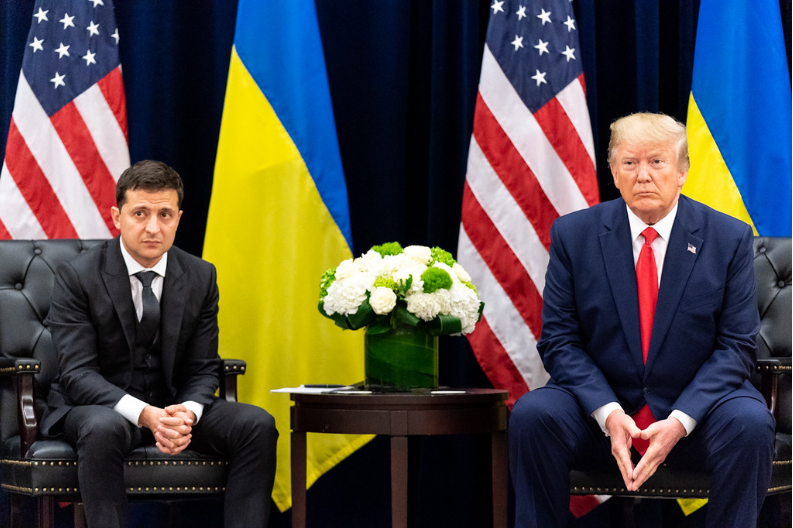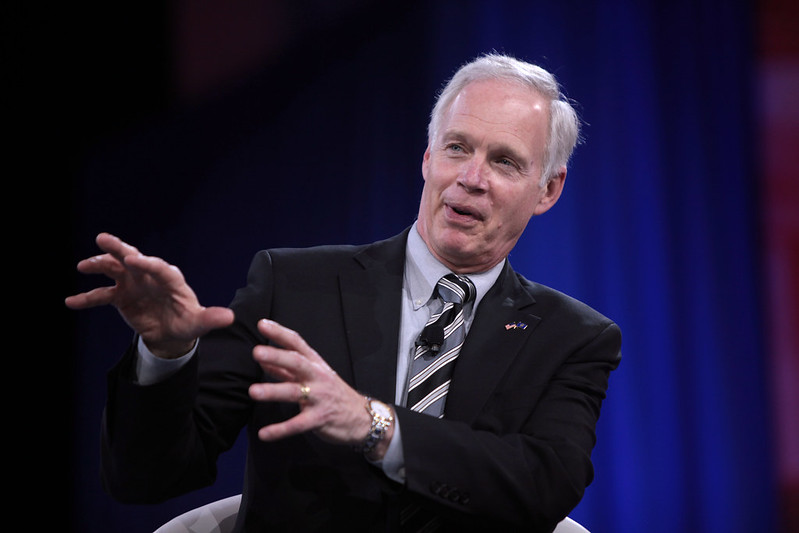Andrew C. McCarthy’s Unconvincing Defense of the President on Ukraine
Over at National Review, former federal prosecutor Andrew C. McCarthy has weighed in on Trump's Ukraine shenanigans and arrived at some out-of-the-box conclusions.

Published by The Lawfare Institute
in Cooperation With

Over at National Review, former federal prosecutor Andrew C. McCarthy has weighed in on Trump's Ukraine shenanigans and arrived at some out-of-the-box conclusions.
He finds that “if a president were to pressure another country to do something for the purpose of damaging a rival and without any benefit to American interests, that would be bad.” But he also concludes that “there is a difference between bad and impeachable. On Ukraine, I’m not even sure what we’re dealing with is all that bad, much less impeachable.”
What, exactly, is McCarthy’s argument?
His starting proposition is that Attorney General William Barr’s efforts to understand the origins of the FBI investigation into Russian assistance to the Trump campaign in the 2016 election is “a legitimate Justice Department probe.” One can agree with McCarthy on this point. It will be useful to the country to have allegations of impropriety by the Obama administration sorted out and (as I expect) put to rest. The federal prosecutor conducting the investigation under Barr’s supervision, John Durham, is an honorable public servant with a distinguished track record in conducting sensitive inquiries. He can be trusted both to produce a fair and objective report and to resist any effort by Barr to skew its conclusions for political purposes.
McCarthy proceeds from that unobjectionable point to the conclusion that “it was perfectly appropriate for an American president to pressure Ukraine to assist an American investigation—the fact that this involved a quid pro quo and can be seen as extortionate is unremarkable” in that the United States routinely ask for quid pro quos in the course of conducting foreign policy.
McCarthy further states that his assumption is that “part of the Barr investigation involves Obama-administration pressure on Ukraine to pursue an investigation of Paul Manafort that was likely to harm Trump’s campaign.” And if that is true, he reasons, “then the Biden/Burisma angle is relevant to Barr’s probe.” Among other things, “it would be probative” of malfeasance by the Obama White House, he writes, “to show that Ukraine was so beholden to the Obama administration that Biden was able to pressure Kiev to fire a prosecutor.”
Turning the tables on Trump’s accusers, McCarthy asserts that
[t]he same people who are screaming about Biden and quid pro quo are indifferent to the undeniable fact that the Obama administration sought and obtained the assistance of foreign governments and intelligence services in the investigation of Trump’s campaign. When it comes to Trump, they would treat a comparatively minor impropriety as a hanging offense; when it comes to Obama, they want to pretend the collusion with foreign governments to interfere in the campaign didn’t happen—or excuse the whole thing because, in their minds, Trump is a monster (but don’t you dare question Good Ol’ Joe).
He further complains that
Obama traded ransom payments and billions in sanctions relief in order to get a nuclear deal that enriched Iran, the world’s leading state sponsor of anti-American terrorism, and gave that regime a straight-line path to becoming a nuclear power. He traded five Taliban commanders for a deserter while the Taliban continued to fight against and kill American and allied troops.
Not much of this makes sense.
First, there is no evidence that President Obama or his team engaged in “collusion” with a foreign government in the 2016 campaign. The sheer number of contacts between the Trump campaign and Russian officials—and also Turkish officials and their cutouts—made an investigation inevitable. Indeed, the FBI would have been remiss in not investigating. Moreover, the bureau’s investigations bore fruit, resulting in criminal convictions of, among others, Trump’s campaign chairman, Paul Manafort, and Trump’s first national security adviser, Gen. Michael Flynn.
Second, both the Iran deal and the Taliban prisoner trade were policy decisions taken in what Obama believed to be the national interest. One can disapprove (as I do) of Obama’s judgment in both cases, but unlike Trump’s intervention in Ukraine, there is no evidence that either decision was taken for even a hint of personal or political advantage.
Third, Trump’s objective in extorting a “favor” from Zelensky involved in part the nonsensical goal of finding out whether the DNC server was somewhere in Ukraine, possibly in the possession of the computer security firm CrowdStrike. This has been made plain by the anonymous whistleblower and the White House memo recounting the Trump-Zelensky telephone conversation, and it was publicly confirmed by Acting Chief of Staff Mick Mulvaney in his Oct. 17 press conference. According to the White House’s own release, here is what Trump is reported to have said in the conversation: “I would like to find out what happened with this whole situation with Ukraine, they say CrowdStrike. I guess you have one of your wealthy people. The server, they say Ukraine has it.”
Notably, McCarthy fails to mention that Trump held up the military assistance to Ukraine in part to compel the government to pursue an investigation into the CrowdStrike-server issue. Indeed, despite its centrality to the scandal, the name CrowdStrike does not appear even once in his piece. There is no ongoing “legitimate” investigation into this matter by Barr and Durham. McCarthy scrupulously avoids informing readers that Trump’s extortion scheme revolved around a fringe conspiracy theory.
Fourth, while it is not in dispute that Joe Biden pressured Kyiv to fire a prosecutor, it is widely accepted that the prosecutor in question was corrupt. Far from acting to advance his son’s business interests, Biden—then vice president—was operating in accord with Obama administration plans and also had the backing of the International Monetary Fund and European allies of the United States. McCarthy omits mention of any of that.
Finally, the withholding of military aid to a country in desperate need was not a step taken as part of the Barr-Durham investigation. When Mulvaney claimed otherwise in his presser, an unnamed senior official of the Justice Department issued an extraordinary rebuke: “If the White House was withholding aid in regards to the cooperation of any investigation at the Department of Justice, that is news to us.” McCarthy elides this critical point. The quid pro quo—the provision of vital military assistance in exchange for launching an investigation—was a backhanded and covert form of extortion undertaken for Trump’s personal electoral advantage, not an effort to secure assistance with a Justice Department investigation.
None of these facts are sufficient to deter McCarthy from concluding that Trump had clean hands with respect to Joe and Hunter Biden. Writes McCarthy, “[T]o say the inclusion of Biden in the quid pro quo was not just inappropriate but impeachable is ridiculous.”
But there is something else that is truly ridiculous. Even as McCarthy leaps over facts and contorts logic to defend Trump’s every action, he omits a significant detail—namely, that he wrote an entire book calling for the impeachment of Barack Obama. McCarthy repeatedly notes in that book that the remedy of impeachment is “impractical as a response to all but the most egregious abuses of executive power.” But Obama, he found, had engaged in just such egregious abuses.
McCarthy’s book is titled “Faithless Execution: Building the Political Case for Obama’s Impeachment.” It includes a draft “Articles of Impeachment” consisting of 60 pages out of 155 pages of text and containing seven different counts.
One of those counts pertains to obstruction of justice. McCarthy found that Obama engaged in the “systematic stonewalling of Congress,” worthy of impeachment. How curious, then, that he lets Trump off the hook for stonewalling Congress on a scale that would make Richard Nixon blush. Other counts are equally frivolous, like the charge that Obama defied “federal law requiring the president to address the impending insolvency of Medicare,” something that Trump, too, has done. Yet other counts verged deeply into a type of John Birch Society conspiratorialism, such as the supposedly impeachable offense entailed in Obama’s “abridgment of First Amendment free speech rights in order to appease Islamic supremacists by adopting repressive sharia blasphemy standards.”
Last December, I wrote a piece for the Daily Beast exploring McCarthy's double standards with respect to the possibility of impeaching, respectively, Obama and Trump. With the months that have elapsed, the conclusion I drew then holds even more force today:
[B]y consistently inculpating a Democratic president for imagined high crimes while assiduously laboring to exculpate a Republican president for conduct that regularly trespasses on fundamental constitutional norms, McCarthy displays a double standard that is extraordinary in its brazenness.
As the Trump presidency flounders and impeachment grows almost inevitable in the House of Representatives, McCarthy’s leaps of logic and elisions of pertinent facts are a spectacle that reveals a great deal about the moment in which we live.



-final.png?sfvrsn=b70826ae_3)

